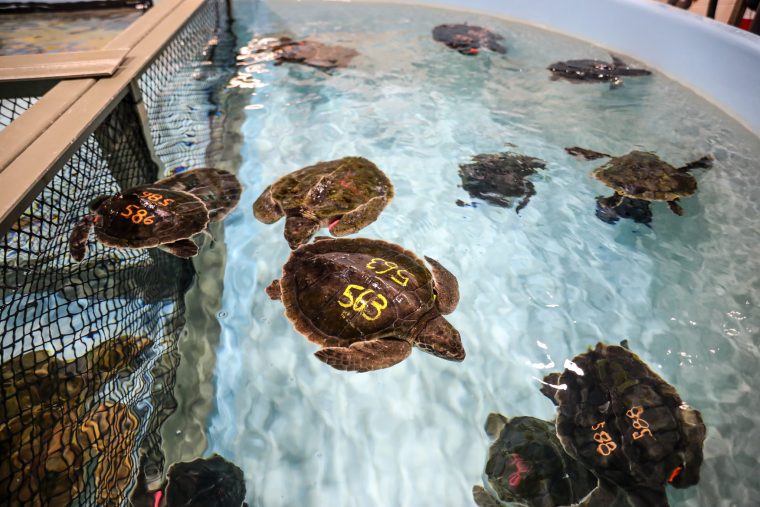Please note: We strongly recommend purchasing tickets online in advance during the heat wave, as our ticket booth is located outdoors.
Volunteer pilots transport 79 turtles triaged at Aquarium, NMLC; more than 500 turtles rescued from Cape Cod beaches so far this season

QUINCY, MASS. (Dec. 10, 2021) – With cold-stunned sea turtles continuing to strand on Cape Cod in high numbers, volunteer pilots flew 79 turtles to secondary rehabilitation facilities in New York, New Jersey, and Florida on Friday to make room for new arrivals in Massachusetts.
**PHOTOS AND VIDEO AVAILABLE HERE, WITH CREDIT TO NEW ENGLAND AQUARIUM**
The turtles were rescued from the beaches of Cape Cod by volunteers and staff with Mass Audubon Wellfleet Bay Wildlife Sanctuary and taken to the New England Aquarium and National Marine Life Center (NMLC) to receive life-saving care. In coordination with the National Oceanic and Atmospheric Administration (NOAA) Fisheries Service, pilots with the non-profit organization Turtles Fly Too flew 72 turtles from the Aquarium and seven from NMLC out of Marshfield Municipal Airport, bound for facilities where they will continue rehabilitation: Atlantic Marine Conservation Society, Sea Turtle Recovery, Clearwater Marine Aquarium, Mote Marine Laboratory & Aquarium, and The Turtle Hospital.
“The New England Aquarium has an incredibly dedicated team of biologists, veterinarians, interns, and volunteers that make our sea turtle rescue work happen. But we say it every year—we cannot do this alone and are proud to be part of this collaborative network of conservation partners,” said Adam Kennedy, Manager of Rescue and Rehabilitation at the Aquarium.
More than 500 turtles have washed ashore on Cape Cod beaches so far this season. The team at the Aquarium’s Sea Turtle Hospital in Quincy, MA, has cared for 396 sea turtles in the past three weeks, most of them critically endangered Kemp’s ridley turtles, with NMLC taking in 29. The animals, which also include loggerhead and green turtles, are treated for life-threatening medical conditions including pneumonia and dehydration, a result of days or weeks of hypothermia and the inability to feed.
“The National Marine Life Center is excited to participate in the rescue, triage, and rehabilitation efforts for cold-stunned sea turtles this year. Each cold-stun season brings new learnings about the marine environment and an opportunity to advance science and medical care for these endangered species,” said Lisa Becker, Director of Marine Wildlife Rehabilitation at NMLC. “Due to temporary facility limitations, NMLC can only help in a reduced capacity this season, but we are looking forward to strongly support our network partners again next year and in the future.”
Each year, hundreds of cold-stunned sea turtles wash up on the beaches of Cape Cod. Because of the rapidly changing water temperature and wind pattern, many turtles cannot escape the hook-like area of Cape Cod Bay before becoming hypothermic. That’s when Mass Audubon volunteers and staff come in, patrolling the beaches for stranded turtles and transporting the animals to the Sea Turtle Hospital triaged and rehabilitated. This year, the cold-stun season got off to a late start due to temperature fluctuations that kept Cape Cod Bay warm. Mass Audubon’s sea turtle program manager Bob Prescott says the later than usual start to the season has been challenging.
“We’ve become accustomed to getting hundreds of turtles each fall. But this year, they’ve been coming in over a shorter span of time, and we’ve been getting a steady flow of turtles almost regardless of tide and winds,” Prescott said.
Once turtles are stabilized, veterinarians examine animals that need further care before they can be released back into the wild and clear others for travel to secondary rehabilitation facilities. Staff with NOAA Fisheries identify rehabilitation centers across the country that can accept the stabilized turtles, which frees up room locally for new arrivals in Massachusetts. Turtles Fly Too plays a key role in transporting the turtles to these facilities.
“The Massachusetts cold-stunned sea turtle response effort is an amazing collaboration between beach responders, rehabilitation facilities, volunteer pilots, and state and federal partners who all come together, working towards the same mission of saving these endangered species,” said Kate Sampson, Sea Turtle Stranding and Disentanglement Coordinator for NOAA Fisheries. “NOAA’s role is to coordinate all of these different partners to ensure good communication and efficient, safe transport.”
“Turtles Fly Too understands the urgency to help endangered species be moved quickly to long-term rehabilitation hospitals so they can be successfully re-released into the wild. We are thankful to our ‘Turtle Fliers’ who volunteer their time, talents, and aircraft to fly each mission and are proud to help with the coordination,” stated Leslie Weinstein, President of Turtles Fly Too.
Donations are crucial for all these non-profit organizations to continue this important conservation work. Those interested in learning more about sea turtle rescue efforts are encouraged to visit these websites:
Mass Audubon Wellfleet Bay Wildlife Sanctuary
MEDIA CONTACT:
Pam Bechtold Snyder – psnyder@neaq.org, 617-686-5068
